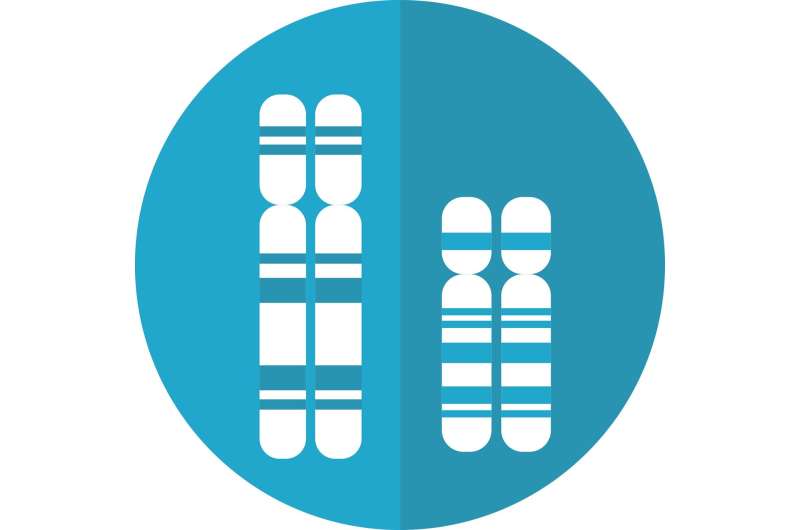Genetic cause of difference in sexual development uncovered

Researchers at the Francis Crick Institute, the Institut Pasteur and their clinical collaborators have identified a cause of testicular tissue developing in people with female chromosomes.
"Differences in sexual development" (DSD) are genetic conditions in which there is a mismatch between the chromosomal sex, XY or XX, which are typically of males and females, and some aspect of their anatomy, for example, an XY individual born as female or XX individual born as male. In many of the cases the genetic cause is unknown. The prevalence is 1 in 2,500-4,000 individuals.
In this paper, published in Proceedings of the National Academy of Sciences, researchers looked into a complex condition where people with two X chromosomes, which is typical of females, have testicular tissue instead of ovaries, or gonads with a mixture of both.
They focused on a subset of people with this rare condition, who also do not have the Y chromosome gene (SRY) which is usually needed for the creation of male reproductive organs.
By analyzing the DNA of 78 children with this condition, they found that 9% had mutations affecting a specific part of another gene called Wilms' Tumor 1 (WT1), that is located not on a sex chromosome, but on one of the other 22 chromosome pairs.
Using human cell cultures, they found that these changes interfere with the delicate balance between the promotion of either the formation of male testis or female ovaries. This imbalance suppresses a protein (β-CATENIN) which is important to the development of ovaries, resulting in the balance shifting to favor the development of testicular tissue.
"There are still many unknowns when it comes to the development of sexual organs. And for some patients with differences in their sexual development, and their families, the condition can be confusing and upsetting".
"Understanding the underlying cause of sexual differences could help make it easier to identify hard to diagnose conditions and help families and doctors make more informed treatment and management decisions," says Anu Bashamboo, group leader of the Unit of Human Developmental Genetics, at the Institut Pasteur, Paris.
To test their findings, the researchers experimentally altered the WT1 gene in mice to mimic one of the human mutations. When this change was introduced into mice with two X chromosomes, which normally develop as females, these developed signs of male development.
"The WT1 gene was well known to be important for testis development. It's really interesting that we've found it also plays a crucial role in development of ovaries," says Robin Lovell-Badge, group leader of the Stem Cell Biology and Developmental Genetics Laboratory at the Crick.
"It appears to have a dual function, creating one protein with parts that contribute to male and others to female development," continues Robin. "Small changes in the balance of these two functions appear to alter the way sexual organs develop, even if our chromosomes are male or female."
"It is often difficult to understand how these differences develop in humans because these changes take place early on in development. By the time they are diagnosed, often well after birth, it is too late to study them. Recreating the mutation in mice gives us the opportunity to prove that it causes these differences and to learn why and how they occur in the presence of the mutation," says lead author Nitzan Gonen, group leader at The Mina and Everard Goodman Faculty of Life Sciences, Bar-Ilan University, Israel.
The researchers will continue to study the role of the WT1 gene in sexual development.
More information: Caroline Eozenou el al., "Testis formation in XX individuals resulting from novel pathogenic variants in Wilms' tumor 1 (WT1) gene," PNAS (2020). www.pnas.org/cgi/doi/10.1073/pnas.1921676117




















